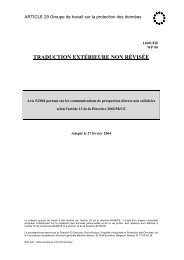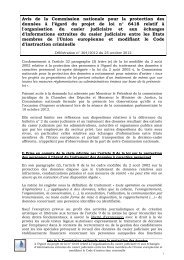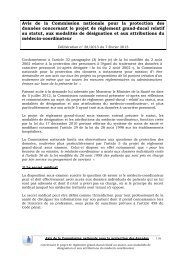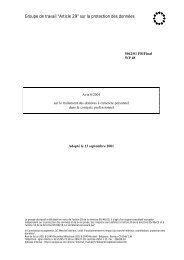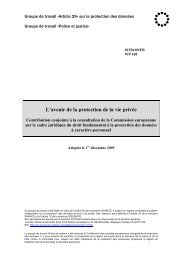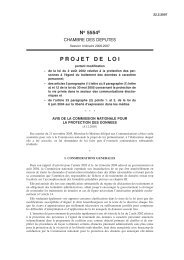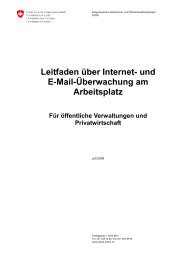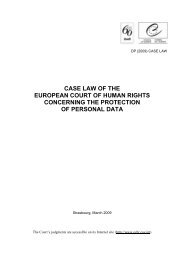case law of the european court of human rights concerning the ...
case law of the european court of human rights concerning the ...
case law of the european court of human rights concerning the ...
Create successful ePaper yourself
Turn your PDF publications into a flip-book with our unique Google optimized e-Paper software.
It was common ground that <strong>the</strong> settled practice <strong>of</strong> intercepting communications on behalf <strong>of</strong> <strong>the</strong> police<br />
in pursuance <strong>of</strong> a warrant issued by <strong>the</strong> Secretary <strong>of</strong> State was <strong>law</strong>ful under <strong>the</strong> <strong>law</strong> <strong>of</strong> England and<br />
Wales. There were, however, fundamental differences <strong>of</strong> view between <strong>the</strong> Government, <strong>the</strong> applicant<br />
and <strong>the</strong> Commission as to <strong>the</strong> effect, if any, <strong>of</strong> certain statutory provisions in imposing legal restraints<br />
on <strong>the</strong> manner in which and <strong>the</strong> purposes for which interception <strong>of</strong> communications may <strong>law</strong>fully be<br />
carried out.<br />
The Court found that, on <strong>the</strong> evidence adduced, in its present state domestic <strong>law</strong> in this domain is<br />
somewhat obscure and open to differing interpretations. In particular, it cannot be said with any<br />
reasonable certainty what elements <strong>of</strong> <strong>the</strong> powers to intercept are incorporated in legal rules and<br />
what elements remain within <strong>the</strong> discretion <strong>of</strong> <strong>the</strong> executive. In <strong>the</strong> opinion <strong>of</strong> <strong>the</strong> Court, <strong>the</strong> <strong>law</strong> <strong>of</strong><br />
England and Wales does not indicate with reasonable clarity <strong>the</strong> scope and manner <strong>of</strong> exercise <strong>of</strong> <strong>the</strong><br />
relevant discretion conferred on <strong>the</strong> public authorities. To that extent, <strong>the</strong> minimum degree <strong>of</strong> legal<br />
protection to which citizens are entitled under <strong>the</strong> rule <strong>of</strong> <strong>law</strong> in a democratic society is lacking.<br />
The Court <strong>the</strong>refore concluded that <strong>the</strong> interferences found were not “in accordance with <strong>the</strong> <strong>law</strong>"<br />
within <strong>the</strong> meaning <strong>of</strong> paragraph 2 <strong>of</strong> Article 8.<br />
[see paragraphs 69 to 80 <strong>of</strong> <strong>the</strong> judgment]<br />
(c) Were <strong>the</strong> interferences “necessary in a democratic society” for a recognised purpose?<br />
Undoubtedly, <strong>the</strong> existence <strong>of</strong> some <strong>law</strong> granting powers <strong>of</strong> interception <strong>of</strong> communications to aid<br />
<strong>the</strong> police may be "necessary" for prevention <strong>of</strong> disorder or crime". However, “in a democratic<br />
society'' <strong>the</strong> system <strong>of</strong> secret surveillance adopted must contain adequate guarantees against abuse.<br />
In <strong>the</strong> light <strong>of</strong> its conclusion under (b), <strong>the</strong> Court considered that it did not have to examine fur<strong>the</strong>r<br />
<strong>the</strong> content <strong>of</strong> <strong>the</strong> o<strong>the</strong>r guarantees required by paragraph 2 <strong>of</strong> Article 8 and whe<strong>the</strong>r <strong>the</strong> system<br />
complained <strong>of</strong> furnished those guarantees in <strong>the</strong> particular circumstances.<br />
[see paragraphs 31 to 82 <strong>of</strong> <strong>the</strong> judgment]<br />
3. "Metering" <strong>of</strong> telephones<br />
The records <strong>of</strong> metering contain information, in particular <strong>the</strong> numbers dialled, which is an integral<br />
element in <strong>the</strong> communications made by telephone. Consequently, release <strong>of</strong> that information to <strong>the</strong><br />
police without <strong>the</strong> consent <strong>of</strong> <strong>the</strong> subscriber amounts to an interference with <strong>the</strong> exercise <strong>of</strong> a right<br />
guaranteed by Article 8. The applicant was potentially liable to be directly affected by <strong>the</strong> practice<br />
which existed in this respect. Despite <strong>the</strong> clarification by <strong>the</strong> Government that <strong>the</strong> .police had not<br />
caused his telephone to be metered, <strong>the</strong> applicant could claim to be <strong>the</strong> victim <strong>of</strong> an interference in<br />
breach <strong>of</strong> Article 8 by reason <strong>of</strong> <strong>the</strong> very <strong>of</strong> <strong>the</strong> practice.<br />
No rule <strong>of</strong> domestic <strong>law</strong> makes it un<strong>law</strong>ful for <strong>the</strong> telephone service to comply with a request from <strong>the</strong><br />
police to make and supply records <strong>of</strong> metering. Apart from this absence <strong>of</strong> prohibition, <strong>the</strong>re would<br />
appear to be no legal rules <strong>concerning</strong> <strong>the</strong> scope and manner <strong>of</strong> exercise <strong>of</strong> <strong>the</strong> discretion enjoyed by<br />
<strong>the</strong> public authorities. Consequently, so <strong>the</strong> Court found, although <strong>law</strong>ful in terms <strong>of</strong> domestic <strong>law</strong>, <strong>the</strong><br />
resultant interference was not "in accordance with <strong>the</strong> <strong>law</strong>", within <strong>the</strong> meaning <strong>of</strong> paragraph 2 <strong>of</strong> Article<br />
8.<br />
19



